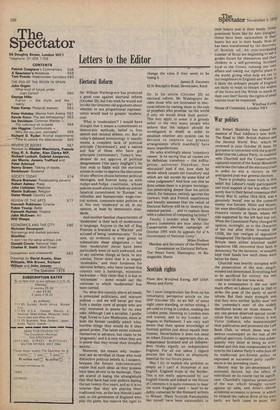Electoral Reform
Sir: William Waldergrave has produced a good case against electoral reform (October 25), but I do wish he would not invoke the tiresome old argument about whether or not proportional representation would lead to greater 'moderation'.
What is 'moderation'? I would have thought that it meant a commitment to democratic methods, belief in free speech and rational debate, etc. But in today's debased terminology it usually means a complete lack of political principle ('doctrinaire'), and a hatred and fear of those who have got principles ('extremists'). Today's 'moderates' do not approve of political disagreement ('the party dogfight'). So they wish to fiddle with the electoral system in order to deprive the electorate of any effective choice between political ideologies, and forever lump us with nudge-and-fudge coalitions, whose policies would always include an almost fanatical commitment to 'Europe,' an inflexible and bureaucratic wage-con. trol system, corporate-state policies et al. Not very 'moderate' at all, in my opinion, at least by democratic standards.
And another familiar characteristic of 'moderates' is their lack of moderation in language. Anyone to the left of Reg Prentice is branded as a 'Marxist' and accused of being 'undemocratic.' To be sure, no evidence is ever given to substantiate these allegations — but then 'moderates' never have been particularly keen on such awkward, not to say extreme, things as facts, in any context. Never mind that it is largely 'moderates,' and their fondness for electoral bribery, who have turned this country into a bankrupt, economic backwater — they claim that it is due to 'extremism' — some would say the extremes to which 'moderation' has been carried.
No, what this country above all needs is principled politicians, and relevant policies — and we will never get that from a motley crew of people who are only interested in power for its own sake. Although 1 am a socialist, I prefer High Tories to Low Moderates, since at least the former candidly admit what horrible things they would do if they gained power. The latter never commit themselves in advance, but claim to be 'pragmatic,' and it is only when they are in power that they reveal their dreadful secrets.
Moreover, the reason why 'moderates' are so terrified of those who hold distinctive political beliefs is, I suspect, because the former subconsciously realise that such ideas as they possess have been shown to be bankrupt. They are scared of losing the stranglehold that they have had over politics during the last twenty-five years, and so it is no surprise that they are playing their traditional role, as the late Harold Laski said, as the gentlemen of England who play the game, but reserve the right to change the rules if they seem to be losing it.
James R. Gaussen 52 St Botolph's Road, Sevenoaks, Kent Sir: In his article (October 25) on electoral reform, Mr Waldegrave derides those who are interested in elec. toral reform by casting them in the role of prophets who promise `us the world if only we would drink their potion'. This may apply, to some: it is grossly unfair to the very many people who believe that the subject should be investigated in depth in order to establish whether any system can be devised to improve our present arrangements which manifestly have many imperfections.
He talks scathingly about 'transitory causes'. Is he saying that all causes are by definition transitory — the suffra• gettes, universal franchise, free education? And if not, how does he decide which causes are transitory and which are not except by some kind of value judgement? And how can this be done unless there is a proper investigation penetrating deeper than his article which, for instance, entirely ignores the German, Irish and French experiences and blandly assumes that the result of Electoral Reform will be to 'destroy the national parties . . and to replace them with a collection of competing factions'?
Finally, I wonder what Mr Walde-. grave's comments are now about the Conservation election campaign of October 1974 with its appeals for a"A Government of National Unity".
Miles Hudson Member and Secretary of the Hansard Commission on Electoral Reform The Priors Farm, Mattingley, nr Basingstoke, Hants
































 Previous page
Previous page